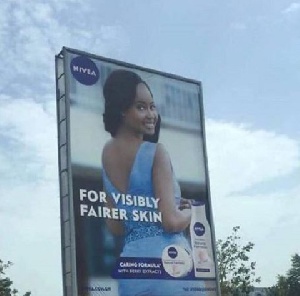 The advert sparked social media outrage driven by rapper Fuse ODG
The advert sparked social media outrage driven by rapper Fuse ODG
It’s going to take more than a woke rapper and hashtag campaign to dismantle the colourism that shades ideals of beauty and success in Africa.
Last week, global skin care brand Nivea was heavily criticized in Ghana and beyond for its “Natural Fairness” body lotion, which promised to enhance the dark skin tones of its West African customer base.
The campaign starred Nigerian beauty queen Omowunmi Akinnifesi.
In the short clip, her skin lightens as the glow of the lotion passes over it, and thanks to the halo effect, the rest of her life seems to improve in a slow-motion and with the help of a wind machine and graphic effects.
Consumers are savvy enough to know that lotion does not solve life’s problems. It doesn’t even—as the advert implies—make the school run to pick up your kids any easier.
Yet, the narrative at the core of Nivea’s campaign tapped into a mass media message that has been used on people of colour for decades: features closer to those of a white person are most desired.
It isn’t just skin colour. It’s the width of noses, the thickness of lips and the texture of hair. This white supremacy has been perpetuated by people of colour for decades, and the beauty industry has profited off these insecurities in Asia, Africa and South America, where people of diverse ethnicities have internalized the idea that their natural features are not good enough.
In Ghana, the advert sparked social media outrage driven by rapper Fuse ODG. Fuse, whose real name is Nana Richard Abiona, is on a mission to that involves “re-programming the world’s mental image of Africa.”
Incensed by a Nivea billboard with the tagline “For Visibly Fairer Skin,” he started the #PullItDownCampaign that spread like wildfire among outraged Twitter users.
It is imperative that we as a people ensure that our media and ad space is not anti-black in nature. #PULLITDOWNNOW
— African Feminist (@FeministAfrikan) October 18, 2017
These girls wanna bleach!! Whether it’s Nivea, Dove, Fair and White, acid, whatever! #PULLITDOWNNOW
— Neina Amina (@nabi_mina) October 20, 2017
Dear Nivea, too many people are ruining their skin because of ads like this. COLOURISM is not a myth. #PULLITDOWNNOW pic.twitter.com/VSkl83vgEw
— Jennifer K. Akuamoah (@J_Akuamoah) October 18, 2017
Nivea responded saying the campaign was not meant to offend any of its customers, but all that did was spark another campaign, #ILoveMyShadeOfBrown.
Ghanaian women posted pictures of themselves alongside the billboard as an affirmation of their darker skin tones.
Ghana, is also one of the few African countries actively trying to discourage the use of dangerous skin-bleaching products.
#ilovemyshadeofbrown #NiveaTakeItDown #pullitdownnow #Ghana cc: @NIVEAUSA @niveauk pic.twitter.com/qbPfMeB2ZT
— Nicole Amarteifio (@AllThingsAfrica) October 22, 2017
#NiveaTakeItDown #ILoveMyShadeOfBrown https://t.co/F9pWnAlt0o
— B. Otoo (@Bridget_Otoo) October 22, 2017
Earlier this week, Nivea caved to public pressure in Ghana, replacing the billboard with one that features dark-skinned models. Social media users, hailed it as a victory.
POWER OF THE PEOPLE. Let's keep pushing! Location: Kasoa, Accra, Ghana #BlackIsBeautiful #PullItDownNow pic.twitter.com/XzUGuEeGPm
— Fuse ODG (@FuseODG) October 20, 2017
Blaming Nivea, skin-bleaching companies or hair straightener manufacturers is naïve, though. Nigerian author, Elnathan John and several commentators made that point on Twitter, stressing Nivea is only marketing products that African consumers want.
The author added some nuance to the online debate, unearthing evidence of a preference for light skin and western features in nineteenth-century Nigeria.
The following is from the book Baba of Karo a story of a Hausa woman born in the late 1870s. These are her words: pic.twitter.com/F9U8FfFudD
— Elnathan John (@elnathan_john) October 20, 2017
The following is from the book Baba of Karo a story of a Hausa woman born in the late 1870s. These are her words: pic.twitter.com/F9U8FfFudD
— Elnathan John (@elnathan_john) October 20, 2017